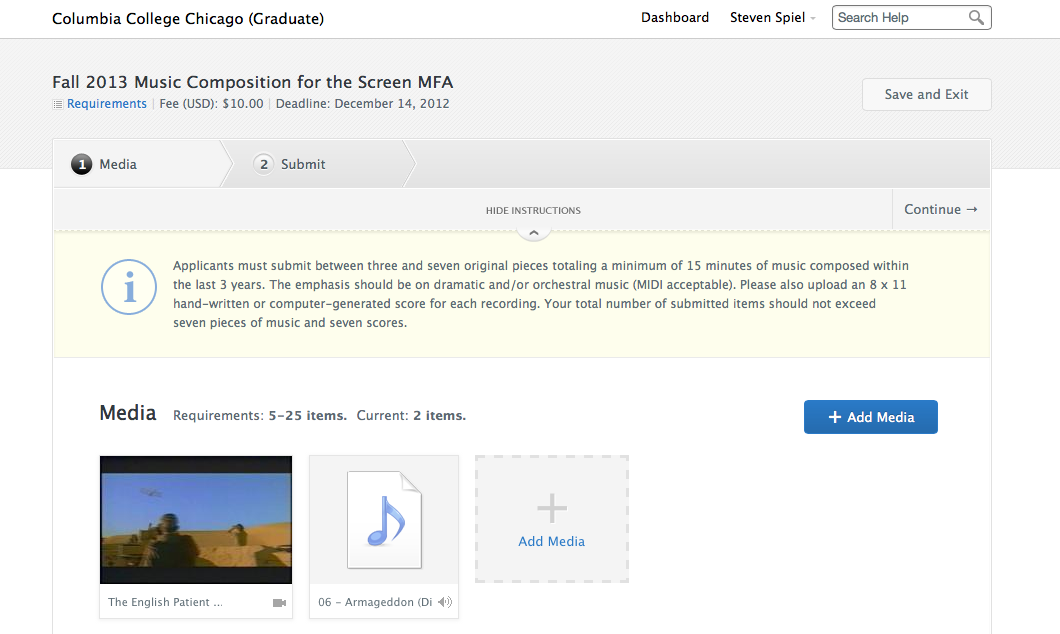
The Application Process
[flickr id=”8205226776″ thumbnail=”medium” overlay=”true” size=”original” group=”” align=”none”]
I thought I’d take a quick break from all the fabulous interviews on the Semester in LA and address a few things concerning the graduate application process. As you may know, in order to apply for the Music Composition for the Screen MFA 2013 class, you need to have all your material submitted by DECEMBER 14, 2012. If you’re applying to another program or for another admission year, be sure to check the program deadlines page.
I’ve received a few emails with questions about the application process, and I thought it would be good to answer some of those on the blog.
When are my recommenders notified to send in their letters of recommendation?
The best way to have your letters of recommendation submitted is electronically. In the Letters of Recommendation section within the online application, check the box that indicates your recommenders will be submitting their letters electronically.
As soon as you enter in your recommenders’ information and hit “Save”, they are sent an email with instructions on how to upload it. If there are any problems and it’s getting down to the wire, have them email gradstudy@colum.edu and put your name and “Music Composition for the Screen” somewhere in the subject line (ex. “Professor X recommending Student X for the Music Composition for the Screen MFA”).
[flickr id=”8205192004″ thumbnail=”medium” overlay=”true” size=”medium_800″ group=”” align=”none”]
Can I upload more than 2 recommenders? What if I have 3?
The website will technically allow you to input more than 2 people’s information. However, there is no guarantee that the committee will actually read the third. Keep in mind that they have a lot of applications to go through, and they don’t want to have to go digging for the gems. You want to present yourself in the most succinct manner possible. Show the very best of you in the fewest words/notes you can.
What if my audio quality/mixing isn’t perfect? Will I get docked points for that?
The committee treats your portfolio a lot like a film company would treat it. The presentation is extremely important. Now, naturally they are musicians and understand that most will not have the tools and libraries and mixing abilities to send in something perfect. If you knew all that, you would have little need for the program. So, they will give prospective students some slack, but you want to make sure it is your very best sounding work. In the end, it’s all about whether your work is going to stand out from the next guy’s. They don’t have a rubric or anything that they use, so they wouldn’t really be docking points, but rather they will look at the entire package, pinning it against others’ presentations, academia, and records, and then making a decision.
[flickr id=”8204113483″ thumbnail=”medium” overlay=”true” size=”original” group=”” align=”none”]
Is there an audition required?
Your portfolio is your audition. Film companies will want to know how quickly you can write and how well it fits their vision of the picture. It’s the final product that really counts.
Do I need to include a video that I scored in my application?
The short answer is no. It would be a good idea to include a film if you feel like it is a strong piece of work. If you have an audio that you feel is stronger, I would go for that. However, I would default to your best programmatic pieces—the pieces that describe events and tell stories. The committee will really want to know how you tackle that.
[flickr id=”8205191982″ thumbnail=”medium” overlay=”true” size=”original” group=”” align=”none”]
I am so thrilled you are looking into the program and working on your application. Keep it up and make sure to email me if you have any questions: music.comp.mfa@colum.edu
